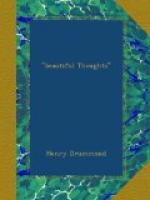November 24th. The Image of Christ that is forming within us—that is life’s one charge. Let every project stand aside for that. “Till Christ be formed,” no man’s work is finished, no religion crowned, no life has fulfilled its end. Is the infinite task begun? When, how, are we to be different? Time cannot change men. Death cannot change men. Christ can. Wherefore put on Christ. The Changed Life, p. 62.
November 25th. Christ saw that men took life painfully. To some it was a weariness, to others a failure, to many a tragedy, to all a struggle and a pain. How to carry this burden of life had been the whole world’s problem. It is still the whole world’s problem. And here is Christ’s solution. “Carry it as I do. Take life as I take it. Look at it from My point of view. Interpret it upon My principles. Take My yoke and learn of Me, and you will find it easy. For My yoke is easy, works easily, sits right upon the shoulders, and therefore My burden is light.” Pax Vobiscum, p. 44.
November 26th. There is a disease called “touchiness”—a disease which, in spite of its innocent name, is one of the gravest sources of restlessness in the world. Touchiness, when it becomes chronic, is a morbid condition of the inward disposition. It is self-love inflamed to the acute point. . . The cure is to shift the yoke to some other place; to let men and things touch us through some new and perhaps as yet unused part of our nature; to become meek and lowly in heart while the old nature is becoming numb from want of use. Pax Vobiscum, pp. 45, 46.
November 27th. Christ’s yoke is simply His secret for the alleviation of human life, His prescription for the best and happiest method of living. Men harness themselves to the work and stress of the world in clumsy and unnatural ways. The harness they put on is antiquated. A rough, ill-fitted collar at the best, they make its strain and friction past enduring, by placing it where the neck is most sensitive; and by mere continuous irritation this sensitiveness increases until the whole nature is quick and sore. Pax Vobiscum, p. 45.
November 28th. No one can get Joy by merely asking for it. It is one of the ripest fruits of the Christian life, and, like all fruits, must be grown. Pax Vobiscum, p. 50.
November 29th Christ is the source of Joy to men in the sense in which He is the source of Rest. His people share His life, and therefore share its consequences, and one of these is Joy. His method of living is one that in the nature of things produces Joy. When He spoke of His Joy remaining with us He meant in part that the causes which produced it should continue to act. His followers, that is to say, by repeating His life would experience its accompaniments. His Joy, His kind of Joy, would remain with them. Pax Vobiscum, p. 54.




